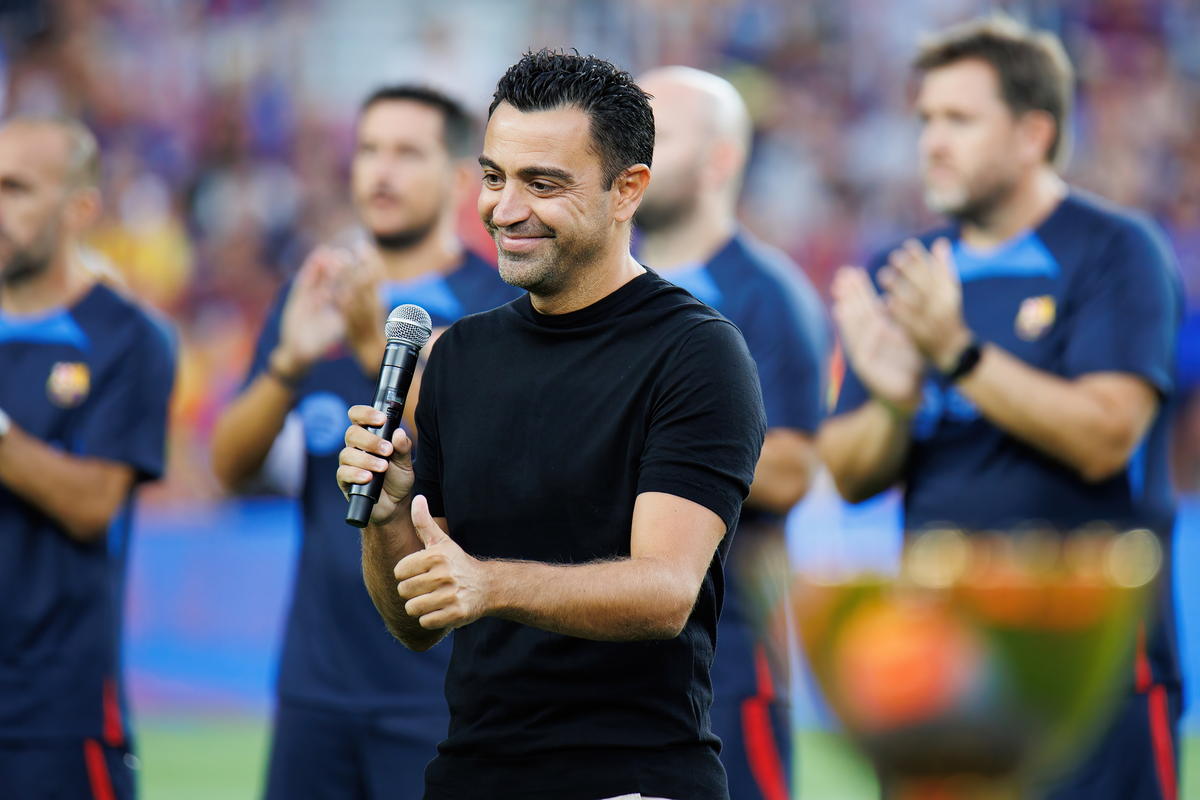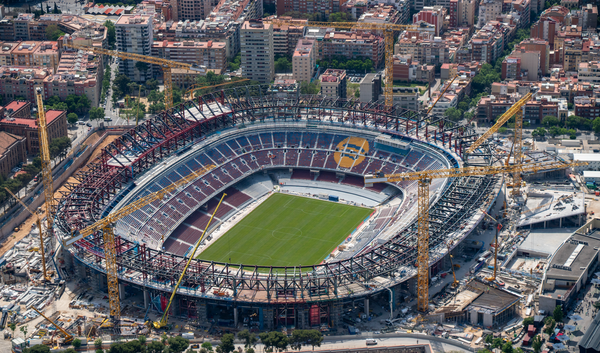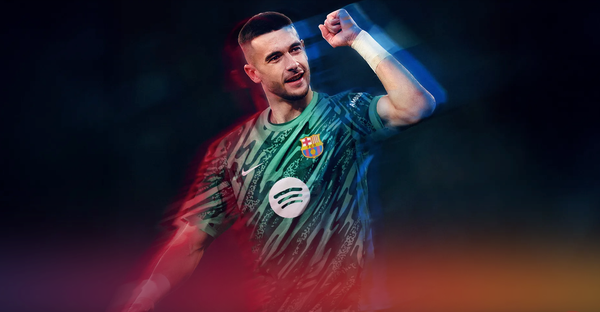Why did Xavi the coach fail?
Xavi came in and stabilised the ship. Sadly, however, he wasn't able to take Barcelona back to the top. We discuss why in this tactical analysis.

A couple of months ago, I called Xavi the (im)perfect coach for an (im)perfect Barcelona. It was meant to represent how both are flawed - Xavi being inexperienced and Barcelona a hot mess - but that the appointment still made sense considering what he was brought in to do; what he was meant to do. Sure, Laporta marketed it as the beginning of a new era; the first step towards greatness restored. Xavi, too, took the job because he felt he was ready, having already turned it down twice beforehand because the moment had not been right. But now? Barcelona were allowed to dream once more.
Dreams, however, are often deceiving, as are most things that come free. And at Barcelona, nothing is free. And nothing comes easy. Xavi’s downfall may be put down to numerous reasons - or excuses, depending on how you look at it - ranging from injuries, injustice, recruitment, state of the pitches and all the way to just downright rotten luck. The problem, however, is that none of these account for probably the biggest factor of them all: coaching.
So what exactly has gone wrong for Xavi the coach?
The project-killing flaw
'It's not new problems that break a team; it's the old, well-known ones that eventually catch up and show against the best of the opposition.'
I wrote this in an old piece dating back to the start of the season. It was a controversial opinion back then since the team had just won a La Liga title and optimism was still relatively high. The problem is, five months before that, I had written another piece addressing those same issues, probably not for the first time either, saying they needed to be fixed if the project was to succeed. They weren't addressed then. They were not addressed five months later. And they remain unaddressed now, halfway through the 2023/24 season.
'Xavi may very well fall prey to the same project-killing flaw if he doesn’t address the fundamental and recurring issues that plague Barcelona.'
And fall prey to them, he did. Unfortunately, entirely predictably so. In January 2024, those project-killing flaws caught up with the team, spelling the demise of the legendary midfielder who then announced he wouldn't be continuing past the 30th of June. So why do old flaws kill projects? It's simple, they insinuate a coaching flaw.
If a coach doesn't address a recurring flaw in his team - whether that's a structural flaw, a flaw in his approach, a flaw in his selection or otherwise - it can generally be traced back to two main reasons: Either he's not aware of the flaw. Or he doesn't know how to fix it. The issue is, at that point, you are trying to pick a lesser evil because both options are bad.
When it comes to the tactical system, Xavi's approach had several interconnected flaws: the overly vertical approach, rigidness and principles of play. All three are recurring flaws. And all three are coaching flaws, too.
So let's look at them more closely.
The verticality issue
Verticality in and of itself is not a flaw; it's a valid approach for many teams and it could, theoretically, be a valid approach for Barcelona, even if it goes against the purist view of the Barcelona etorno. And it just happens to be that Xavi the coach is very inclined to play in a direct, vertical manner. After all, Xavi the player was the same.
When people talk about his playing days, they mostly associate him with control of space and time, technicality and that famous pausa Barcelona players are lauded for. And Xavi certainly encompassed all of those aspects and more. But Xavi the player was also all about identifying and exploiting space. And even more importantly, exploiting it quickly.
'Think quickly, look for spaces. That's what I do: look for spaces. All day. I'm always looking. All day, all day. Here? No. There? No. People who haven't played don't always realise how hard that is. Space, space, space... I see the space and pass.'
So the focus on verticality might be a surprise to the Barcelona fans of the Pep Guardiola era and certainly a shock to the 'Barça DNA purists' but given Xavi's view of football, his upbringing, his ideals and his role models, verticality was always going to be a big part of his coaching philosophy. After all, he quoted both Pep and Luis Enrique as his main teachers, mixing control with directness.
Besides, if an approach yields results, you should by all means stick to it. Whether that's possession-heavy football, transitional football or defensive football, it matters very little as long as it works. So what's the problem with verticality and Barcelona?
The issue is, Barcelona are a team made specifically for a much different purpose; Barcelona are a team made for technical excellence but not coached for technical excellence. What does that mean? It means the recruitment and the profiles of the players at the club are suited to one style of play but are being used in an entirely different way.
Recently, I compared it to using a microphone to paint - you may still do a decent enough job but it would be far simpler and better if you used a brush instead. At Barcelona, Xavi is trying to paint using a microphone; he is using a team of technical monsters and is not coaching them to control, pin the opposition and sustain pressure.
Instead, he wants them to be more like him; he wants them to identify the space and exploit it quickly. Take the ball, pass the ball but dialled to 11.
It's also why Barcelona were more successful and more exciting when the team had the likes of Ousmane Dembele, Adama Traore, Ferran Torres and Luuk de Jong in the lineup. In other words, they were more suited to Xavi's philosophy when they had explosive wingers, attackers of space and a target man to lay the ball off into the runners. And it's also why Dembele, for all his faults and uncertainties, was a fundamental part of Xavi's Barcelona, or at least the ultimate vision of it.
The young Frenchman was the brush among the microphones of Xavi's painting. So when he left, the project turned sour. And that brings us to another issue closely related to verticality: recruitment. Joan Laporta mortgaged the club to reinforce the team with flashy signings that were meant to patch up a faulty squad. However, once again, the recruitment and the game model were not in sync.
Ferran Torres, Ilkay Gundogan, Oriol Romeu, Andreas Christensen, Joao Felix, Franck Kessie, Joao Cancelo, Robert Lewandowski, Raphinha and Jules Kounde were all bought during Xavi's tenure and most of them are yet to be classified as a success. In fact, most have been overshadowed by 16-year-olds from La Masia, which is unbelievable in every sense of the word. Why is that?
Again, the profiles don't match the model. Some of them do, but how do you plan to get the most out of someone like Felix, Cancelo, Kounde or even Gundogan and Romeu if the systems you deploy not only don't highlight their virtues but also don't mask their flaws? Romeu is certainly more of a bandaid than a long-term solution but his profile fits your needs, if the structure around him is not shattered and you don't ask him to be more than he is. In this fast-paced environment focused on verticality, directness and running - lots of running - a Felix, a Gundogan and even a Pedri will not be as good as they can be.
This means that despite their quality, the value they provide is capped and a player of a different, more fitting profile would be more useful even if that player is of lesser quality than the aforementioned trio. They are three microphones trying their best to paint. And as good as they are, a brush will always beat them.
One has to ask, of course, how many of those signings were actually Xavi's? He wanted Martin Zubimendi or Joshua Kimmich but got Romeu. He wanted Bernardo Silva but got Felix, who was the great wish of the president, not the coach, in one of the worst-kept secrets in Catalonia.
That once again means the recruitment and talent ID do not match the game model.
It also means the issues run much deeper than just the coach.
Rigidness
I debated whether to name this section rigidness or not because in some ways, it's a bit unfair towards Xavi. It's unfair in the sense that he has actually shown flexibility throughout his tenure and has been known to adapt from time to time. The four-midfielder system is probably the best example of Xavi doing something different to adjust to the available tools and maximise their potential. And credit where it's due - it worked. At least for a while.
However, the rigidness problem popped its ugly head out once again and Xavi was back to square one. So what exactly is this flaw in the first place? Xavi is a very smart man. In fact, he is a very smart coach; a coach who understands how elite teams play and has a clear idea of football himself. There is no better example than his first half-season at the Camp Nou. That Xavi's Barça was the best Xavi's Barça. And that Barça made me believe we had struck gold with the new coach. Alas, it did not last. Partly due to Xavi's rigidness.
You see, under Xavi, Barcelona fall into the trap of looking like a tactics board team, to borrow a phrase coined by an excellent analyst @MinimumWidth. What that means is that Xavi has this idea of how he wants the team to set up but then it stops there; they occupy those positions for the sake of it because Xavi wants superiority in the last line or wants the wingers specifically to pin the defenders. All of that on paper creates advantages on the pitch. However, just occupying those positions in that static manner, like on a tactics board, doesn’t do much in isolation.
The players need support, they need to ask questions of the defenders, they need to arrive in different spaces, and be mobile and dynamic. All of that matters. The reason why the wingers are often isolated is because Xavi instructs them to pin the defenders and retain their positions without adequately supporting them. So by design, he wants them isolated but because of the nature of the rest of the static structure, they are also isolated from the rest of their team. So accessing them becomes difficult and once you do access them, it’s difficult for them to do anything other than try and create something out of nothing on their own.
So the idea is good - wide wingers that pin defenders, stretch the backline and create isolations. However, the execution is lacking because the rest of the team doesn’t provide the necessary structure for it to be effective. The issue, however, doesn't stop there.
Pep once famously said that he just has to make sure his team gets to the final third and the rest is then on the players. This applies to Xavi's Barcelona too. Only I say this as a negative thing in this context. Let me explain why.
Barcelona have struggled with finishing this season. At the moment, they are the only top-four La Liga team which is not overperforming their expected goals value, registering 48.3 xG while scoring 43. For comparison's sake, the first-placed Girona have scored 52 from only 39.6 xG and Real Madrid have scored 45 from 37.4 xG. So where do these struggles come from? They come from the types of players Barcelona (don't) have and... Patterns.
Manchester City are an extreme case of a team that's been repeatedly labelled as 'too robotic'. Barcelona would likely be on the opposite end of that spectrum. In Xavi's system, there are no set patterns of play in the final third. The only occasional robotic movements coming from the Blaugrana are generally in the build-up phase but even then, that's not at a consistently high enough level. Instead, it's a lot of individualism, which then leads to variance or rather, inconsistency.
But why is that an issue?
As @nonewthing said, in football, we can categorise finishers into two broad groups: systemic finishers and instinctive finishers. The former ones are best used in environments with set patterns because they tend to score from similar situations. The latter ones are more versatile because they don't depend on a set pattern of play; they can create their own goals and score from a variety of situations. Generally speaking, instinctive finishers are more valuable since they can operate equally well in both cases while systemic finishers excel in only one. Naturally, this isn't to say every instinctive finisher is better than a systemic one. It all depends on the player's quality, traits, suitability to the system etc.
Barcelona are a team that lacks a set pattern of play in the final third but they also lack instinctive finishers who can still score goals regardless of that fact. Robert Lewandowski is an instinctive finisher but his heavy decline meant Xavi couldn't rely on him to score as many goals as last season. Felix would be an instinctive finisher but in this system, as a microphone trying to paint, he is unlikely to reach high output anyway.
Torres, on the other hand, is very much a systemic finisher. Give him a set pattern of play and give him familiarity and he will score. Raphinha would be another example of a systemic finisher as his goals generally come in the same way, courtesy of excellent ball-striking. Lamine Yamal, on the other hand, has all the predispositions to become an instinctive finisher with time and of course, Ansu Fati was the best instinctive finisher on the team prior to his injuries.
So what ends up happening is that a lot of non-instinctive shooters and players who are not natural finishers end up in situations where they have to rely on their attacking instincts to finish chances. In other words, you're forcing non-problem-solvers (in a finishing sense) to solve problems.
All of this comes back to the coach creating an optimal environment for his players to thrive. Barcelona have statistically created a lot but the environment, the system and the tactics have not been there to support them in finishing those chances.
That, too, is a coaching issue.
Tactical systems vs principles of play
Leave it to Jose Mourinho to perfectly describe 90% of Barcelona's defensive issues even when not talking directly about them.
— Domagoj Kostanjšak (@DKostanjsak) January 26, 2024
Low block, high block — it doesn't matter; you have to stay compact at all times.
Key principles of play must always remain intact.
Barça need that. https://t.co/JvoJPNKjNO
I love this video of Jose Mourinho perfectly explaining the difference between a tactical system and principles of play. The former is a matter of preference; a choice made by the coach according to which he tailors his approach; it's something that changes to suit the team's needs. The latter is a fundamental aspect of a team; a pillar around which everything else revolves; it's something that's permanent, to use The Special One's term.
For example, a tactical system could be the coach's decision to press high or defend deep. Sometimes, he would deem it necessary to deploy one or the other, depending on the situation. A principle of play, however, would be to remain compact regardless of which one you choose. One is flexible, the other is constant.
Xavi understood this notion. He understood that at Barcelona, you have an obligation to play a certain way; to win a certain way even.
'Barça’s history has demands of us, not of Madrid. Our history for 40 years, when Johan (Cruyff) came, set the bar: to win by playing well. If we don’t play well, we’re not happy. That’s how we Catalans are,' Xavi said last April.
Beautiful football is a very vague principle of play but could be classified as one of the pillars around which everything else revolves at Barcelona. However, 'playing well' means a different thing to different clubs. Mourinho's teams, for example, achieved enormous success playing a completely different style of football to his arch-rival Guardiola. That doesn't make it wrong; it just makes it... Different.
However, certain principles of play, such as the aforementioned compactness, are unique to everyone. Why? Because they apply to every team and are equally important to every team. Sure, some teams may suffer less than others if they don't respect it, if they're better equipped to handle it that is, but they will suffer nonetheless.
And it's that same compactness that Xavi repeatedly failed to drill into his teams. Subsequently, it has been the bane of his managerial tenure since the very beginning of his stay in Catalonia. Incredibly, Barcelona have conceded 19 goals in the last month, having only conceded a total of 20 in the entirety of last season's La Liga campaign. In 2024, as short as it has been so far, they are the team with the most conceded goals in Europe's top five leagues (at the moment of writing). After last year's defensive heroics, this comes as a rude awakening. And it all boils down to a single failed principle of play - compactness, or lack thereof.
So why is this a coaching flaw? It's simple. The quality of your defensive line will inevitably change depending on whether you have a Ronald Araujo leading your backline or a Sergi Roberto (sorry, Sergi!). But both of them have to understand the fundamental principles of play - staying compact, moving as a unit, understanding of positioning etc. Defending, you see, is all about coaching and all about the collective.
Of course, Barcelona are haunted by the lack of natural defenders (players who defend first, and do everything else second) and athletes, but defending as a compact unit is a learned behaviour. Meaning, everyone can do it. Araujo may be a better defender than Roberto but both can maintain the coach's pre-designed structure and respect his principles of play. But for one reason or the other, that just doesn't happen.
And that, is a coaching failure.
Final remarks
How does one evaluate a coach? In a very broad sense, the coach's job is always to optimise his players' performance. That means he's there to create the best possible environment for his players to succeed and instil into them the understanding of foundational principles of play. But a coach, especially a Barcelona coach, has to be more than that. Much more.
As a strategist, it's difficult to give Xavi a passing grade. The things we have discussed in this piece all suggest a coaching failure in one way, shape or form, which was always bound to raise questions. In that sense, we can't say he has created an optimal environment to maximise his players' strengths and mask their flaws.
As a man manager, Xavi was decent, albeit far from perfect. Does he command respect in the dressing room? He is definitely loved, as seen from various interviews following his announcement. But he should not necessarily be his players' friend first, coach second. A bond is welcome and even expected. But without respect and commitment, it all falls apart. That could've been lacking due to several reasons:
- Xavi the player is a legend but Xavi the coach is a newbie
- Being a friend first, boss second
- Being consistently undermined by the president/the board
- Shaky results
But one other critical aspect of a coach, especially with Barcelona's reliance on La Masia, is player development and management. I've decided to separate the two because managing players and ensuring their development are not necessarily the same thing. They complement each other, sure, but tackle different things. Xavi, for example, has introduced many new youngsters into the team and has generally been decent at managing their minutes up until the point when the squad became too thin to properly do so.
Which of them, however, have greatly improved due to the coach's influence, if any? A case could be made for Gavi, Frenkie de Jong or Yamal. But Frenkie was more a positional change than coaching. Lamine just needed minutes to get better. And Gavi? Well, maybe? But even if we give him that, it's still not enough.
When it comes to managing players, has he been good enough to rotate when necessary? To drop players when they needed to be dropped? To change things up when they needed changing? Lewandowski's case comes to mind. Or Pedri's. Or Balde's. All three, sadly, in a negative light. Again, a thin, injury-prone squad leaves you with little choice at times. But even so...
So what can we conclude about Xavi the coach? As much as it saddens me to say it, he wasn't good enough. Xavi understands football; he understands how the elites play; he has a clear vision of what he wants to do. But he doesn't have the tools to do it nor the ability to make it happen without those tools.
In other words, Xavi is a sum-of-your-parts type of coach; a coach who won't take steel and turn it into diamonds. You give him a good team and he will play good football. You give him a great team and he can play great football. But you give him a team that still has great individuals but one that is nowhere near a proper collective and he will struggle to turn them into a great unit.
This Barcelona, Xavi's Barcelona, were too faulty for him to fix. And there are numerous reasons why the job was practically impossible right from the start. But at the end of the day, Xavi the coach did not deliver.




